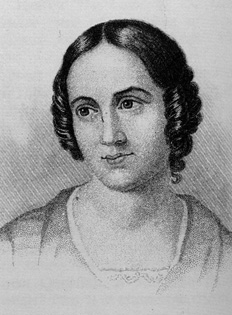|
Caroline Lee whiting Hentz was born in 1800 in Massachusetts. She was a major literary figure who contributed to the advancement of women's fiction (Jones 1). Hentz is best known for her literary contribution to the battle to defend slavery.
In 1824, Hentz married Nicholas Marcellus Hentz (Freibert & White 277). During the early 1830s, Hentz and her husband, along with their three children, moved from Massachusetts to North Carolina. According to stories about their life, they moved every few years, as a result of other men's attention towards Caroline. Jan Bakker writes of Hentz, "she was the beautiful, dissatisfied wife of a jealous schoolmaster" (2,3). The oppression that Hentz must have felt in her marriage majorly influenced the stories that she wrote.
Hentz created female characters that are both assertive and independent. However, not a revolutionary, Hentz tones her characters down by the end of her novels (Bakker 3). The novels that Hentz wrote "simultaneously obey and disobey the literary and cultural authority carried by courtship plotting" (Tracey 2). According to Karen Tracey, Hentz projects the idea of marriage in two versions between the heroine and her suitors. The first marriage proposal, desired by the characters father, is rejected by her. The second proposal, which the father initially rejects, is desired by the heroine. This process questioned traditional "Southern courtship," but not enough to cause a critical uproar among the mostly male critics of the time (Tracey 2). Hentz's challenge to Southern patriarchial society was subtle for a reason. Her decision to tone down the female characters, by the end of her works, show that Hentz thought that the battle against "male chauvinism" was too steep, and not worth the ruin of her literary career (Bakker 6).
Although The Planters Northern Bride included a woman who wedded a man her father didn't approve of, its main purpose was to defend the institution of slavery. Written shortly after Harriet Beecher Stowe published Uncle Tom's Cabin, The Planter's Northern Bride meant to refute Stowe's account of the brutality of slavery. Hetnz claimed that she was more familiar with slavery than Stowe was, as a result of living in the South (Jones 1). In this work, Hentz emphasized the paternalism of slavery, and its benevolence toward the slaves. She claimed that slaves were better off than the "northern woman-worker" that society has left behind. Slaves were housed, clothed, and fed by their owners; who took care of the factory workers (Jones 1)? |
 |
|
Works Cited
Bakker, Jan. "...the bold atmosphere of Mrs. Hentz' and others: Fast Food and Feminine Rebelliousness in Some Romances of the Old South." Journal of American Culture Fall 1998: 1-6.
Freibert and White. Hidden Hands. New Brunswick: Rutgers, 1994.
Jones, Anne G. "Caroline Lee Hentz (1800-1856)." The Heath Anthology of American Literature. http://college.hmco.com/english/lauter/heath
Tracey, Karen. "Little Counterplots in the Old South: Narrative Subterfuge in Caroline Hentz's Domestic Fiction." Journal of Narrative Technique Winter 1998: 1-20.
|
|  |
| Caroline Lee Whiting Hentz 1800-1856 |

|
| Provided by Legacy Photo Gallery |
Hentz also pointed to the financial benefits of slavery, to our country, in order to gain support for the institution of human bandage. Hentz's defense of slavery appealed to Southern and Northern audiences, as fears of miscegenationand racial assimilation were rampant among many whites in both geograpjic locations (Tracey 4,5). Hentz gained popularity as a result of her other works, as well.
Hentz was included in Hawthorne's category of women that he considered a "scribbling mob." Her first novel that gained popularity was Linda, published in 1850. Prior to this, she wrote: Lovell's Folly (1833), DeLara (1843), and Aunt Patty's Scrapbag (1846). She continued to write until her death in 1856 (Jones 2).
Caroline Hentz's novels covered a broad range of topics. Besides her defense of slavery, Hentz also wrote about gender roles and women's lives (Jones 2). Because of her appeal to audiences in both the North and the South, Hentz gained popularity and noteriety in the field of women's fiction. She also helped women's literature to grow, as a result of her efforts.
The Planter's Northern Bride. Proslavery Forces |
 |
|
|

